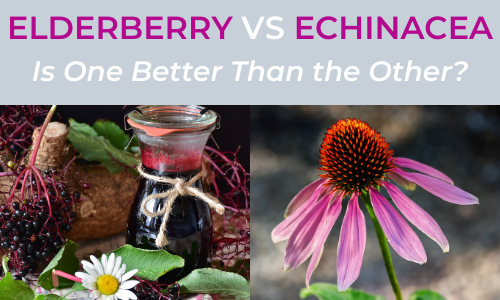Wondering if echinacea vs elderberry is better for your particular situation?
We hope to help you figure that out today.
Most of the time, you can’t go wrong with either one - unless, of course, allergies are at play.
Still, there are times where you might prefer elderberry instead of echinacea and vice versa, so let’s discuss those.
First, we’ll break down the benefits of each.
Elderberry Benefits
Elderberries became popular, in large part, due to their antioxidant effects. And that’s thanks to one of its active ingredients known as anthocyanin.
However, there are other active compounds with their own therapeutic benefits:
-
May decrease severity of the common cold and flu
Anecdotal evidence suggests the benefits of elderberry are best achieved when taken less than 48 hours after the onset of flu or cold symptoms.
The theory behind its effectiveness is its ability to stimulate the production and activity of immune mediators.
One 2016 study showed that those who take elderberry extract regularly have less severe respiratory symptoms following infection.
However, it’s important to note that elderberry has no proven preventive potential.
I know a lot of friends who would argue that point, but more published, peer-reviewed research needs to be conducted on it.
-
May help alleviate constipation
Anthraquinone is a compound in elderberry that’s been hailed for its laxative effect. This same compound has been found in other natural laxatives such as senna.
It prevents and/or minimizes the absorption of water from the intestines during peristalsis. With more water in the intestinal lumen, pressure is generated in the intestines.
Such pressure stimulates muscle activity, enhancing the process of peristalsis.
The extra water also softens fecal matter, making it easier to eliminate.
The only downside about using elderberry for constipation is that it’s been less studied, and some studies suggest it shouldn’t be used consecutively for more than 5 days.
-
May provide some pain relief
Pain is usually a consequence of inflammation. Thanks to elderberry’s rich anthocyanin content, this plant and its fruit can also help fight inflammation.
It works by inhibiting the production of nitric oxide - one of the signaling molecules involved in inflammation.
By blocking the release of nitric oxide, elderberry tampers with the normal inflammatory response and thus relieves pain and other signs of inflammation such as swelling, redness, and loss of function.
Echinacea Benefits
The medicinal value of echinacea is derived from its roots and leaves. The commonly identified benefits of echinacea are its anti-inflammatory benefits, antiviral properties, and immune-boosting effects as well as its antioxidant effects.
Let’s look at a few of those in more detail:
-
May boost immune system function
Studies have shown that echinacea improves the phagocytic potential of white blood cells.
Phagocytosis is the process where white blood cells engulf pathogens and neutralize them. Since cold and flu are usually caused by viruses, this mechanism of echinacea comes in handy.
Echinacea also has plant compounds that increase the production of more white blood cells, especially macrophages.
-
May help regulate inflammation
Interestingly enough, studies suggest that the anti-inflammatory properties of echinacea are so potent they can be used to manage inflammatory conditions like arthritis.
The active ingredients in echinacea extracts can help block excessive inflammatory responses and therefore improve the healing process.
-
May be helpful for the flu
Some incredible studies indicate that echinacea can reduce your chances of developing the flu by up to 58%.
Studies have also shown that taking echinacea reduces the duration of flu symptoms to less than 4 days in many cases.
Situations Where Elderberry May Be Better Suited Than Echinacea (And Vice Versa)
Elderberry doesn’t work well for bacterial infections but seems fairly effective against viral infections.
On the other hand, echinacea has strong antimicrobial properties and works against both bacteria and viruses.
Since respiratory symptoms can be caused by either type of pathogen, echinacea is usually the first “go to” for onset of respiratory symptoms, especially when you don’t know their origins.
Elderberry, however, is better suited for children thanks to its pleasant taste in the form of elderberry syrup and “fun” elderberry gummies.
Echinacea Side Effects
Allergy is the most common side effect of echinacea. Other than that, echinacea is usually safe to use. But if used for long periods of time, you may be more susceptible to nausea, diarrhea, and headaches.
Side effects, of course, vary from one person to the next, and this is by no means an exhaustive list.
Be sure to contact your doctor for advice before, during, or after using echinacea.
Elderberry Side Effects
Elderberry is relatively safe. When over consumed, however, its laxative effects can lead to abdominal cramps and diarrhea.
Besides that, it's important to remember that the medicinal value of elderberries is best obtained from their fruit.
Other parts of the plant such as the stems, roots, leaves, and barks contain a compound called cyanogenic glycoside that can be harmful.
Most of the side effects can be prevented by only taking ripe, well-cooked and properly prepared elderberries or trusted elderberry products.
Can You Take Elderberry and Echinacea Together?
Yes! Currently, no interactions have been found between echinacea and elderberry.
Remember though that few studies have been done on elderberry and echinacea together. However, long-time use and anecdotal evidence suggests that it is safe.
Ideally, both of these herbs are helpful because they have beneficial antioxidant and immune-boosting effects. But when you’re forced to choose just one, elderberry is usually preferred.
It has much higher antioxidant activity and can be used more as a tonic than echinacea.


